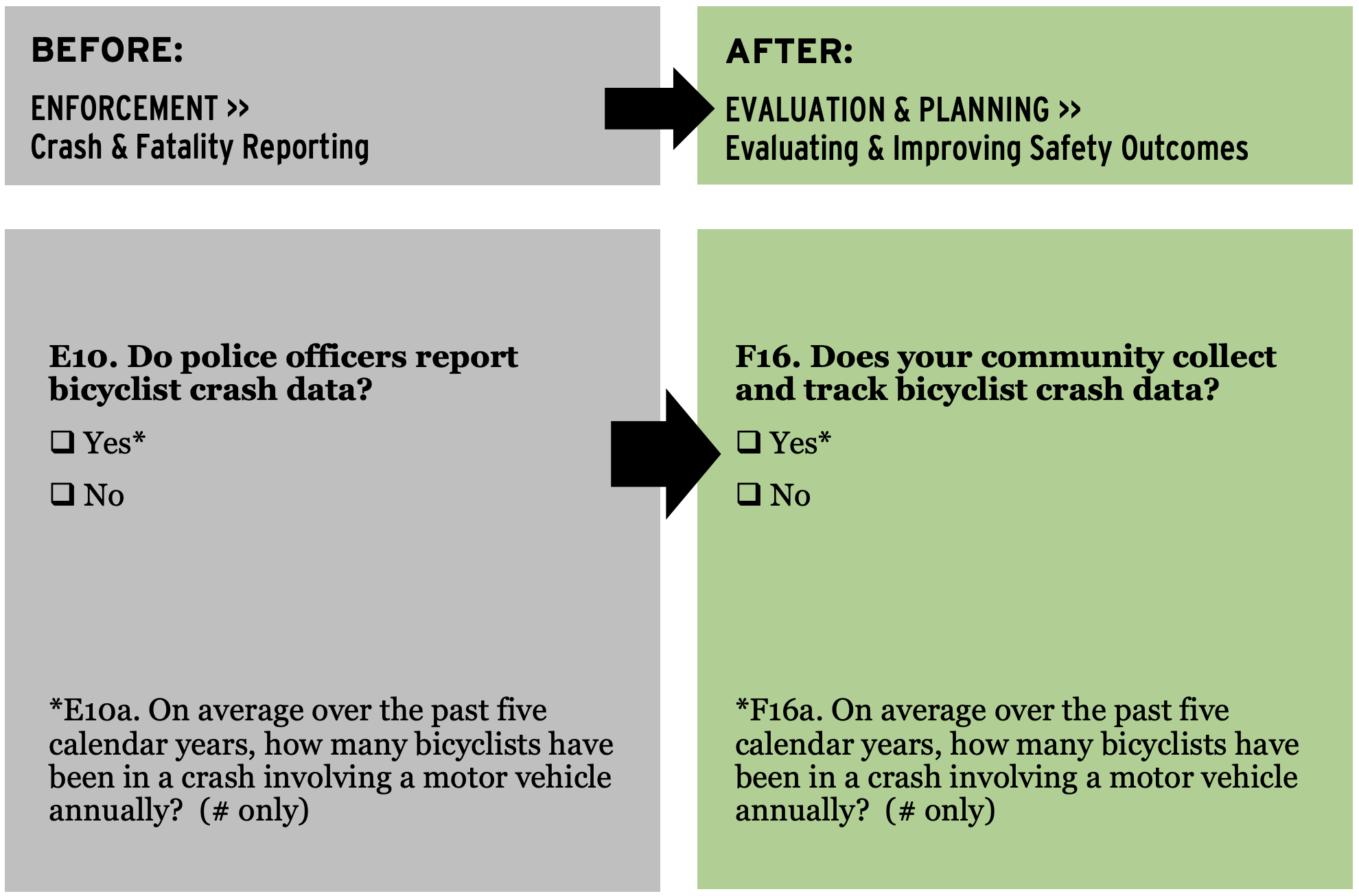DISCOVER YOUR LOCAL BICYCLING COMMUNITY
Find local advocacy groups, bike shops, instructors, clubs, classes and more!
Pedaling Toward a More Just BFA Program: Removing “Enforcement” from our Framework
As of this week, the League of American Bicyclists has officially and permanently removed ‘Enforcement’ as one of the pillars of the Bicycle Friendly America program’s ‘5 E’ framework.
For nearly 20 years, this framework has guided the Bicycle Friendly America program’s applications and judging criteria, assessing communities’ efforts in Engineering, Education, Encouragement, Evaluation and Planning, Equity, and until now, Enforcement. These pillars are intended to guide communities in making bicycling safe and welcoming for everyone.
Read our FAQs for more information and resources about this change
But “Enforcement” does not equal “Safety” for many People of Color, particularly Black Americans. The racial disparities in over-policing of our streets is a barrier that prevents many from considering biking for transportation or recreation. Enforcement as a stand-alone traffic safety tactic is not particularly effective in achieving long-term safety outcomes for anyone biking or walking.
Despite many calls in the past, including internally, for the League and the bike movement at large to reconsider ‘Enforcement’ as a defining characteristic of bicycle-friendliness and to interrogate root causes of racial disparities in bicycling ridership and safety outcomes, this summer served as an admittedly painfully long-overdue tipping point in making this necessary change to the program.
It is time to rethink our approach to traffic safety, so that the freedom and mobility offered by bicycling is truly accessible to all. To do this, we must recognize that a Bicycle Friendly Community cannot achieve its goals without removing these barriers and deeply examining the unjust racial disparities in how enforcement is applied in our streets.
In early June, we took the ‘Enforcement’ sections of the Bicycle Friendly Community and University applications offline and began to reflect on what role, if any, enforcement has to play in the BFA program. In August, we re-published an updated version of the Fall 2020 BFC application and the 2020 BFU application mid-round, with key changes that fundamentally shifted how enforcement is approached in those applications.
 |
| See more examples of how we have revised BFC Application questions >> |
In that August update, the ‘Enforcement’ section remained offline and we reorganized and revised several questions and answer options that had previously lived under ‘Enforcement,’ integrating the revised questions throughout other ‘E’ sections of the applications, with the goal to:
- Remove the presumption or necessity of police involvement in bike safety activities, such as bicycle crash data collection or community bike light giveaways, by moving these topics to other ‘E’ sections and by revising related questions/answer options;
- Encourage communities to reduce and de-emphasize traffic-related policing and potentially punitive/discriminatory enforcement practices through alternatives such as automated enforcement (e.g. speed and red light cameras), street design improvements, and educational diversion programs;
- Acknowledge that state and local-level traffic laws, and the enforcement of those laws, will likely continue to be used by most applicant communities and, as a result, should be the focus of rigorous ongoing evaluation and data collection efforts by communities and the BFA program to analyze and improve related equity and safety outcomes;
- Improve understanding of demographic data related to existing traffic enforcement, to encourage communities to increase transparency and accountability in policing and enforcement practices, and to identify and eliminate racial bias in both automated and in-person traffic enforcement.
These changes are just step one in the transformation that the BFA program must undergo to fully realize our vision of a Bicycle Friendly America for Everyone.
What’s Next
With the BFC program’s Fall 2020 submission deadline now behind us, today we have published the Spring 2021 BFC application and made those August updates summarized above official, including the permanent removal of ‘Enforcement’ from the BFC program’s ‘5 E’ framework. Over the coming year, we will determine what further changes are needed.
We are developing a Bicycle Friendly America Equity Fellowship program to serve as a more meaningful engagement tool for the BFC program to center equity in our review process, and to elevate the voices of transportation equity experts in the development of the program. Beginning this fall, the Fellowship program will aim to recruit, train, and compensate bicycle advocates, practitioners, and researchers of color to participate in the BFC review process and help shape the future of the application and program.
The League’s local, state, and federal advocacy work also plays a critical role in influencing the broader laws, policies, and funding mechanisms that can either support or hinder local traffic safety efforts. The League is working to apply the principles outlined above from the BFA program into our policy work, by focusing on how we can support federal and state changes to traffic safety that are consistent with our BFA goals to remove Enforcement as a policy pillar, and to prioritize equitable investments in safe transportation. The League will continue to tackle inequities and racial disparities in bicycle safety and ridership outcomes through our other programs as well. Visit bikeleague.org/equity for a list of where we’re starting, but certainly not where we’re ending our work.
We welcome feedback on these BFA application and program changes from our network of League members, BFC and BFU applicants, and local bike advocates who are engaging on these very issues within their own communities across the country. We appreciate all the feedback we’ve received to date in support of this long-overdue decision, and we are committed to continue to listen and learn from our partners and program users on the ground to continually assess what additional changes the BFA program must make to further the cause of an equitable Bicycle Friendly America for everyone.